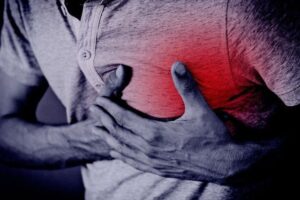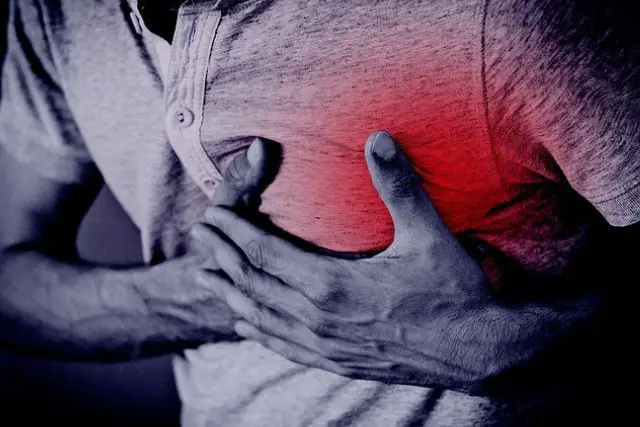6 Signs of Heart Attack a Month Before
Six signs of heart attack that may appear a month before include unusual fatigue, shortness of breath, indigestion, anxiety, back pain, and sleep 6 Signs of Heart Attack a Month Before.
Awareness of heart health is paramount, as cardiovascular diseases remain a leading cause of death globally. A heart attack doesn’t always strike without warning—sometimes subtle signs can herald its approach weeks in advance. An understanding of these symptoms isn’t just for those at risk; it’s vital information for everyone.
Our bodies may send us these signals, indicating that something is amiss with our heart’s normal functioning. By staying vigilant and recognizing potential pre-heart attack signs, timely intervention and consultation with a healthcare professional could save lives. Learning and acting upon these signals is a proactive step towards maintaining heart health and can be life-saving.
Recognize Early: The Importance Of Heeding Heart Attack Warnings
Identifying early symptoms of a heart attack could save a life. Often, our body sends signals a month in advance. These warnings are vital and should never be ignored. Acting on them quickly can prevent severe damage to the heart muscle. Recognizing these signs early on is imperative for timely medical intervention.
It’s about being proactive and knowledgeable. Learning to read the subtle signs that your body is in distress is an essential skill. Such signs can appear as unusual fatigue, unexpected breath shortness, or even discomfort in the chest. Each symptom could be a potential red flag. By understanding and taking quick action, you could greatly improve your chances of a positive outcome.

Unusual Fatigue: The Subtle Warning
Feeling extremely tired without a clear reason can be a quiet alert. It may signal something is wrong with your heart health. This isn’t the common weariness after a long day. It’s a deeper, unexplainable exhaustion. It might show up even after a full night’s sleep or a short walk.
This kind of fatigue is seen in both men and women. It could hint at an upcoming heart attack. Pay attention to sudden, unusual tiredness. Coupled with other signs, it’s time to consult a doctor. Early detection could save lives. Keep note of how often and how quickly fatigue sets in.
| Sign | Possible Indication |
| Unusual Fatigue | Early heart attack warning |
| Persistent tiredness | Consult a healthcare provider |
Breathlessness: A Silent Alarm
Experiencing breathlessness may feel like a lack of air. It is often a silent sign of a heart attack. This can happen even during simple tasks which usually are not challenging.
Common activities that may cause this sensation include:
- Walking up stairs or hills
- Cleaning or house chores
- Carrying groceries
- Playing with children or pets
Paying attention to this change is crucial. It could save your life. Talk to a doctor if you feel out of breath often.
Sleep Disturbances: Nocturnal Predictors
Poor sleep often warns us about health troubles. A bad sleeping pattern might tell you about heart risks. Interruptions during the night can signal upcoming problems. The body needs rest, and sleep problems may relate to heart issues.
Some people face trouble falling asleep. Others wake up feeling unrested. Some wake up too early and can’t sleep again. These signs can be subtle hints from your body. Unusual fatigue during the day is also a clue. Paying attention to these sleep-related symptoms is key.
- Difficulty falling asleep at night could be a warning.
- Waking up tired hints at rest being incomplete.
- Early morning awakenings might suggest risk.
- Feeling unusually fatigued during daytime is notable.
Indigestion And Nausea: Unexpected Indicators
Many people miss early warning signs of a heart attack. These signs often show up as gastrointestinal issues, like indigestion and nausea. It may seem odd, but your stomach can signal heart trouble. Sudden stomach upset without a clear cause can be a silent cardiovascular symptom. Pay attention to unexplained heartburn or stomach pain, especially if you’re not prone to digestive issues.
These symptoms might seem minor or easy to dismiss. But considering them can be critical. Your stomach and heart share a complex nerve network. Stress on the heart can affect your stomach. Always consult a doctor if you experience these issues consistently.
Perspiration: The Sweaty Signal
Excessive sweating can be a red flag for heart issues. Unusual perspiration, especially when resting, may signal a heart problem. It’s vital to recognize the differences between normal sweating from exercise or high temperatures and concerning sweat patterns linked to heart attack warning signs.
Typically, we sweat more in warm environments, during fever, or while exercising. Yet, sudden, unexplained cold sweats or clammy skin without these triggers could indicate a potential heart attack a month in advance. Notably, stress-related sweating differs from heart-related sweating. The latter may occur without any mental stress and can be accompanied by chest discomfort or breathlessness.
Lingering Chest Discomfort: A Classic Sign
Chest pain is a red flag for a possible heart attack. This pain can feel like pressure, squeezing, or fullness. It’s not often the most obvious symptom or even the most severe one. Some people may experience it mildly while others may feel crushing pain. It’s critical to evaluate the severity and duration of pain.
The pain often lasts for a few minutes or more. It might go away but come back later. Physical activities or emotional stress can trigger the pain. If rest or medication doesn’t help, it’s a strong sign something is wrong. Recognizing the characteristics of chest pain is crucial. Don’t wait if chest discomfort is persistent or unusual for you. Contact a healthcare provider immediately.
Responding To The Alerts: Next Steps
Spotting the early signs of a heart attack could save your life. Immediate action is crucial.
Discuss your symptoms with a healthcare professional as soon as possible.
Making positive lifestyle changes is essential for prevention. These include adopting a healthy diet, staying physically active, and managing stress effectively.
Quitting smoking and limiting alcohol intake can significantly reduce heart attack risk. Remember to regularly monitor your blood pressure, cholesterol levels, and weight.
Stay proactive in heart health to ensure longevity and wellbeing.
Frequently Asked Questions Of 6 Signs Of Heart Attack A Month Before
What Happens 1 Month Before Heart Attack?
One month before a heart attack, some may experience warning signs. These include unusual fatigue, shortness of breath, sleep disturbances, indigestion, and increased anxiety. Recognizing these early symptoms is crucial for timely medical intervention.
Which Four Symptoms Indicate an Upcoming Heart Attack?
Four signs of an impending heart attack are chest pain, shortness of breath, discomfort in upper body, and sudden dizziness or lightheadedness.
Can You Tell In Advance If You’re Going To Have A Heart Attack?
Predicting a heart attack in advance is not certain, but warning signs like chest discomfort and shortness of breath can indicate an upcoming event. Regular check-ups help assess risk factors.
What Should You Never Do During A Heart Attack?
During a heart attack, do not ignore the symptoms or delay seeking help. Avoid physical exertion and do not drive yourself to the hospital. Steer clear of self-medicating with aspirin unless advised by a healthcare professional. Remain composed and make an emergency service call right away.
Conclusion
Recognizing these six heart attack warning signs can be lifesaving. Early detection is key to managing heart health. Stay vigilant and consult a doctor if you notice any symptoms. Remember, proactive measures greatly enhance survival rates. Prioritize your heart; it’s the only one you’ve got.














